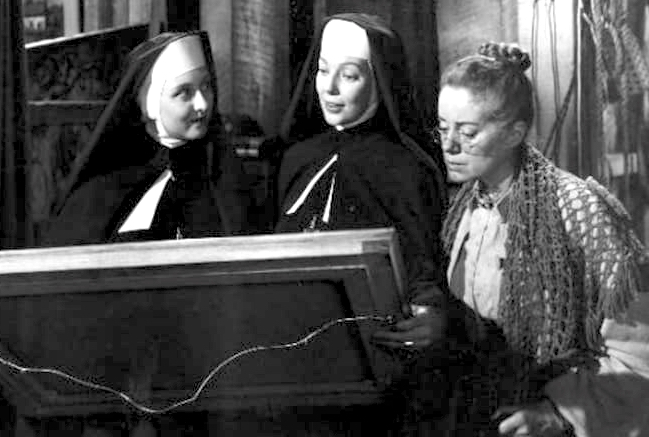by Nathaniel R

Have you ever queued up an old movie no one talks about anymore hoping to discover a gem?
You imagine that it's only been forgotten or is underdiscussed due to the vagaries of when and where movies are available in the ever changing landcape of viewing technologies, Such was my fantasy when I sat down to watch Come to the Stable (1949). This French nuns in New England comedy was my biggest viewing gap in 1949 Oscar history. In fact, I didn't even know it was a comedy.
Alas the fantasy of stumbling upon a forgotten gem didn't last long. Still, Come to the Stable's tagline must have been true in 1949. It read...
The picture your heart will fall in love with..."
People did fall in love with it. (Or at least their hearts did. Nun pictures aren't interested in the other body parts. Unless they're that kind of nun picture).
The Academy nominated it for an incredible but faintly inexplicable 7 Oscars, though wisely they stopped short of the Best Picture honor. Loretta Young (my mother's favorite!) and Celeste Holm had both won Oscars on the same night two years earlier for The Farmer's Daughter and Gentleman's Agreement respectively, so perhaps this was a breathlessly anticipated pairing?
Young and Holm play sisters from a French convent who travel to New England due to a vaguely defined promise Sister Margaret (Young) once made to God about building a children's hospital when she returned home to the States. There is precious little explanation given as to why the actual French nun Sister Scholastica (Holm) is with her. They must have had very loose rules for nuns in the 40s because wouldn't they be assigned to locations? Or is Hamlet's famous 'get thee to a nunnery' that vague on purpose because "a" nunnery implies that any location will do!

The nuns barrels through the picture with tunnel vision looking at that hospital goal and the comedy erupts from how loose their relation to traditional obstacles (like, oh, reality) actually is. They just assume God will clear the path for them and convince, say, a gangster to give up his real estate or that scads of money will appear in just 30 days and so on and so on. This being an inspirational picture, it mostly goes just as the nuns would like. For all its hokey predictably and pleasant but extremely simple performances (Oscar nominations???) the picture has its charms. That's mostly in the way the nuns are utterly blind to how difficult they make everyone else's lives around them, how unexpectedly tough the nuns invasion is on both the devout (Elsa Lanchester in the film's fussiest but also best turn) and the agnostic (Hugh Marlowe as a local composer with a totally endearing Great Dane as companion).
Have you seen this one?